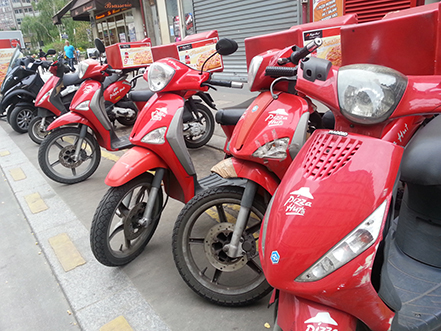
Here are five things I’ve learned during the last 3 weeks in Paris:
#1: Own REAL Things.
Last week I walked past an umbrella repair shop. Let’s think about that for a second: an umbrella repair shop. Can you imagine owning an umbrella that’s so good it merits repair?
Probably not. Most of our possessions are disposable junk. If something breaks, we throw it away and buy another one. We replace rather than repair.
So Lesson #1: Own real things. Don’t equate “frugality” with buying the cheapest, plastic, mass-produced piece of crap on the Walmart clearance rack. Sure, it’s cheap, but it’s also garbage. It won’t stand the test of time.
It’s better — in my view — to own and use things that are made from solid materials, like stone and wood and quality fibers. Things that have craftsmanship and durability. Things that will stand the test of time.
When the soles of your shoes wear down, re-sole them. When your umbrella rips, stitch it. When you lose weight, tailor your clothes. Don’t fill your life with disposable junk. Your possessions should be fewer, but better.
#2: “New” Does Not Equal “Better”
This goes hand-in-hand with the previous point: “New” does not equal “better” if something is well-made.
People in the U.S. tend to prefer “new construction” homes. That’s because most American homes are disposable — nothing more than drywall on a slab foundation. They weren’t built to last. After only 30 or 40 years, they start falling apart. Isn’t something wrong with that picture?
In Europe, the older homes have stood for centuries. And barring any massive war or natural disaster, they will stand for centuries more. They were built to last.
Lesson #2: To whatever degree is possible within your own life, build things to last.
- If you’re launching your own business, focus on creating a legacy and succession, not just on next quarter’s revenues.
- If you write, create content that leaves a legacy, not just article-spun crap that’s geared for search engines.
- If you’re buying a home, look for something that’s sturdy and well-built. A “real house” never has a true owner, only a series of caretakers.
#3: Resources Are Precious
This observation literally stopped me in my tracks: Pizza Hut makes deliveries on scooters. (Check out the photo at the top of this post).
That makes total sense, when you think about it. Why do you need a whole car to deliver a pizza, when a scooter will do? If you’re delivering a few pizza boxes, you don’t need to lug your entire empty backseat and trunk along for the ride.
So Lesson #3: Resources are precious, so don’t waste any more than you need. Money, gasoline, and even air space are valuable commodities.
#4: Live Small & Efficient
Compared to a typical American home, my home is small. I don’t have a garage, dining room, hallway closet, or a laundry room.
Our washer/dryer are in the kitchen. We eat around the kitchen island. We park our cars on the street, and we store Will’s tools and my gardening supplies in a corner of the living room.
As a result, many frugal tactics that I read simply don’t work for me.
- “Buy in bulk.” Really? Where on earth am I supposed to store 96 rolls of toilet paper?
- “Host a garage sale.” Really? Where am I supposed to store all that junk in the meantime?
Then I went to Eric’s apartment in Paris. Eric and his girlfriend are both in their late 20s / early 30s. They work for a major international company. Their space is fairly typical for a young professional couple. It’s 269 square feet (25 square meters).
Suddenly, my inability to store bulk items from CostCo didn’t seem so bad. Small is relative. And I could minimize more, curate my possessions, find more efficient storage solutions.
Lesson #4: Live small. This goes hand-in-hand with not wasting resources. Maintaining a large house costs a lot of money and energy. Focus on living more efficiently, rather than living largely.
#5: If You Have Space, Use It
On the flip side, our “ample space” allows us to maintain a do-it-yourself lifestyle. When the dishwasher breaks, we can grab tools (from our living room) to fix it. When our gutters get clogged, we climb a ladder to clean it. And although I store gardening supplies in my living room, I’m able to grow fresh tomatoes, peppers and broccoli throughout the summer.
When space is truly small — like 269 sq. ft. — that DIY-culture just isn’t possible. You’re not going to paint your own walls; where would you store the trays, cans and rollers when you’re finished? You’re not going to grow your own fresh vegetables and herbs; at most, you’ll have space for a few container-grown plants.
If you choose to occupy a larger space, utilize it. You have an opportunity to fix your own appliances, grow your own produce, to craft your own beer. Use it.
